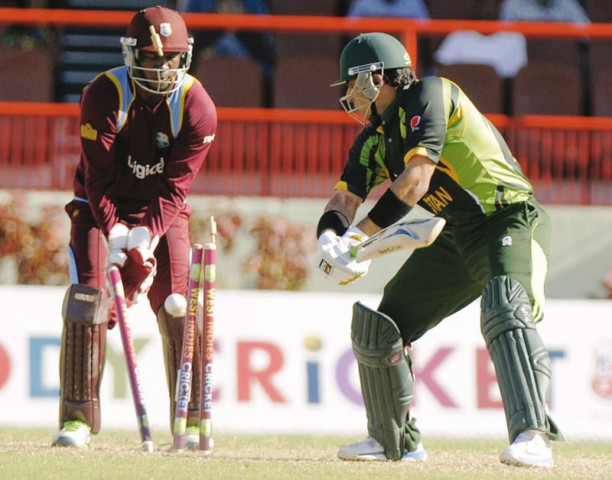Pakistan must exorcise demons of 2014
There are no two ways about it, last year was not a kind one for Pakistan in the ODIs

There are no two ways about it, last year was not a kind one for Pakistan in the ODIs. PHOTO COURTESY: WICB
There are no two ways about it, last year was not a kind one for Pakistan in the ODIs. The side won only six matches and lost 10, with a win/loss ratio of 0.6. In comparison, they won 16 and lost as many in 2013; a win/loss ratio of 1.

The numbers in terms of bilateral series make for even poorer reading. Pakistan won five series in 2013 and lost two. In 2014; there were no series wins, only three losses.
So who is to blame? The short answer: the batsmen. The long answer: the regular batsmen.
In 2013, the top two run-getters in the world were Pakistanis; Misbahul Haq and Muhammad Hafeez. The duo made 1,373 and 1,301 runs respectively, at an average of 54.92 and 46.46. Last year, Ahmed Shehzad was the only player from Pakistan to make it into the top 20, barely making it into 20th with his 629 runs in the calendar year.
Haris Sohail and Sarfraz Ahmed only became regulars in 2014, while both Younus Khan and Sohaib Maqsood have been in and out of the side since 2013 for one reason or the other. So of the eight specialist batsmen selected for the World Cup, only Umar Akmal, Shehzad, Misbah and Hafeez have been regular members of the side for the past two years.
The quartet made 3,877 runs between themselves in 2013 at an average of 44.56. Last year they managed only 1,636 at an average of 32.08. The decrease in runs can be explained by the fact that Pakistan have played only 16 matches in 2014, as compared to 34 in 2013. But the decrease in averages over 12 months is alarming. To put it in simpler words, Pakistan’s four best batsmen over the past two years made, on average, 50 runs fewer in every match last year.
Haris Sohail and Sarfraz Ahmed were two of Pakistan’s brighter lights in 2014 and will have to carry the beacon if the established names continue to misfire. Sohail improved drastically on his 2013 score of 45 at an average of 15 by scoring 235 at an average of 58.75 last year. Sarfraz did the same, making 254 runs in 2014 as compared to his 29 in 2013. The wicketkeeper more than doubled his 2013 calendar year average of 14.5 to 36.28 in the process.
Since 2013, Pakistan have not won a match in which they have scored less than 200. During the time they have won 22 matches, scoring at an average of 37.56 at a run-rate of 5.39. In the matches they have lost, they have scored at an average of 22.25 at a run-rate of 4.62.
The bowlers tend to paper over the worryingly large cracks often left behind by inept batting. But now there is a considerably large Saeed Ajmal-sized hole that also needs filling. Pakistan may yet pull of the spectacular with the ball in hand every now and then but even their bowlers require something to work with.
Despite its own fair share of troubles, the bowling has continued to more or less perform consistently. It may seem like an obvious thing to say but Pakistan win when they bat well and lose when fail to do so — but the latter is becoming increasingly more common.
So if 40-year-old Misbah is to wrap his hands around the cold silver and gold World Cup trophy come March 29, then the batsmen must deliver. The men with the blade will decide Pakistan’s fate; for better or for worse, they have been doing so for a while now.
Published in The Express Tribune, January 21st, 2015.
Like Sports on Facebook, follow @ETribuneSports on Twitter to stay informed and join in the conversation.



















COMMENTS
Comments are moderated and generally will be posted if they are on-topic and not abusive.
For more information, please see our Comments FAQ